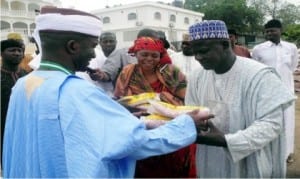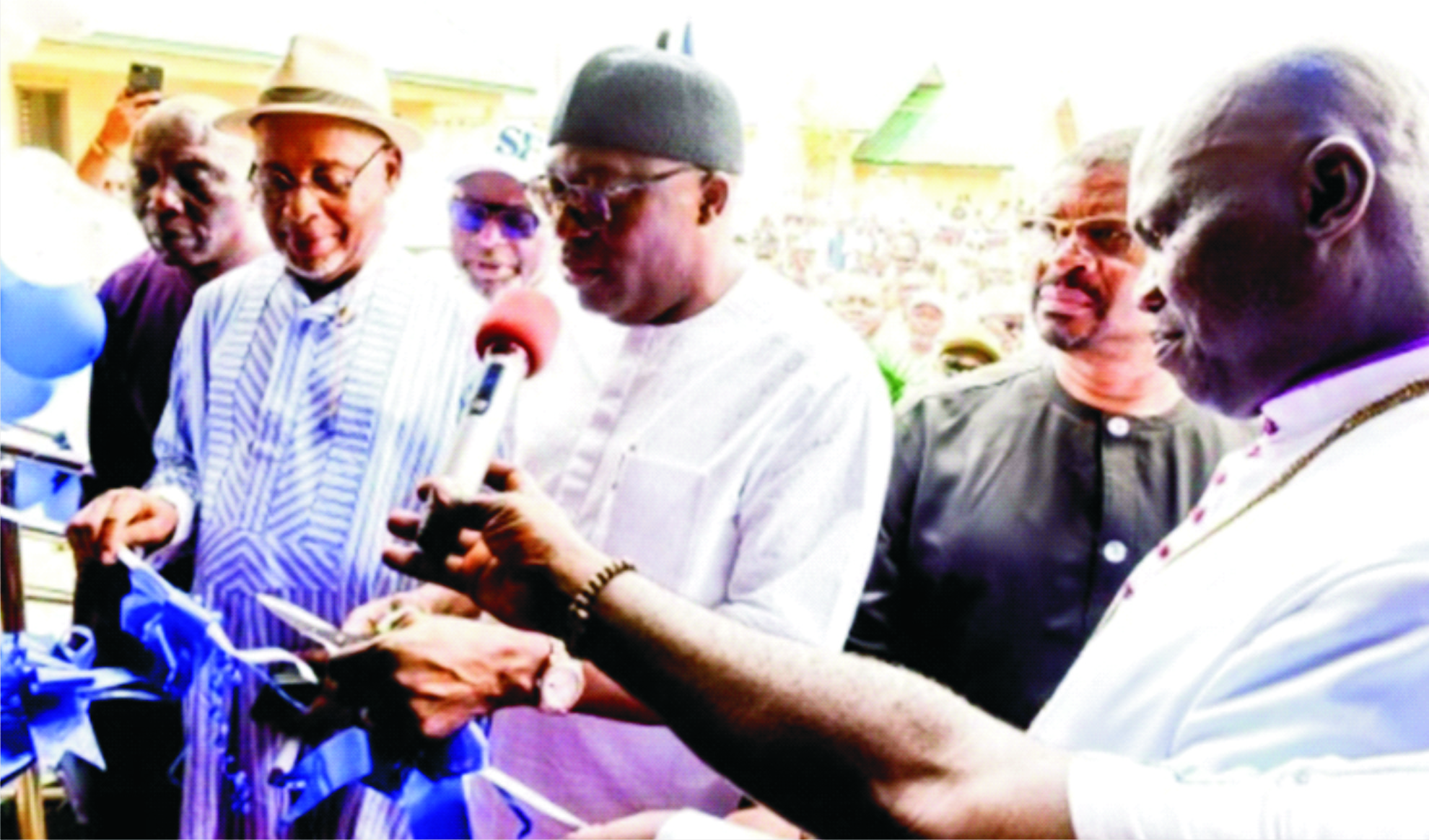City Crime
Songhai Farms: Boosting Integrated Farming

Senator Abdul-Aziz Nyako of Adamawa Central Senatorial District (left), distributing improved maize seedlings to farmers in Yola, recently. Photo: NAN
Have you ever found
a place where nothing is considered a waste, where man, animals, plants, and where all that nature has got to offer are harnessed; each relying on the other without friction?
Finding such a place seems impossible but it exists in Songhai Farms in Porto-Novo, Republic of Benin.
Tourists note that in the farm, everything is re-generated. Leaves, stems and roots are used to produce animal feeds, soil mulch and compost manure while aquatic plants, such as water hyacinth, are used to generate gas and purify water.
Animal wastes such as droppings, horns, bones, intestines, feathers are equally used for biogas production and compost manure while rain water is harvested for aqua-culture, irrigation and human needs.
In the farm, tourists observe that one becomes so in tune with nature because all food items are organic (natural) without additives or any form of chemicals.
Songhai Centre, a 200-acre land that has become an international non-governmental development organisation, was founded in 1985 by a Nigerian-born American Catholic Priest, Rev. Fr. Godfrey Nzamujo.
It has become a destination for agro-tourists from around the world. It is named after a prosperous and powerful empire that was very strong in West Africa between the 14th and 16th centuries.
“Songhai for us is not that empire but the spirit of a people that can carry themselves and know how to make a good reading of their environment and discover the opportunities therein.
“And again, how to convert these into common wealth, rather than individual wealth, which most leaders in Africa are infamously known for today,’’ Lazarus Dourossimi, a tour guide at the centre said.
Apart from citing its regional base in Porto-Novo, the centre has three other farms in Savalou, Parakou and Kinwedji, all in Republic of Benin.
The Porto-Novo centre has pens for chicken, grass-cutters/rabbits, turkey, guinea fowls and quails while the snails and others are kept in neat houses.
The maggot uses the intestines of slaughtered animals and dung to produce relatively big ones that are used in feeding fish.
The farm, a mini-town on its own, has metal workshops, pottery workshops and an industrial zone for the production of bio-energy, liquid and bar soaps, plastics, fruit juice, fish mill and a slaughter house.
It also has administrative blocks, communication buildings, multi-purpose halls, staff and student quarters, feed mill, rice mill, compost production, swimming-pool, chapel, meeting and conference rooms.
It has variety of hotels and restaurants where various natural cuisines are prepared and served to visitors as well as a supermarket where only organically-grown produce and finished products from the farm are sold.
“I want to be a part of Africa saying no to this logic of poverty. When I see brothers and sisters, I am really grateful that we are not giving up. We want to give our children something different.
“In Nigeria, we are being trained to face the problems of yesterday. We are doing our training in agriculture of yesterday.
“We are not seeing the challenges of today and preparing ourselves for the challenges of tomorrow which are very simple.
“It is a challenge of employment for all, particularly young men and women. It is to remove poverty in terms of what we eat, food security and the way we live,’’ Nzamujo told a group of Nigerian agro-tourists who visited the centre recently.
Tourists observe that the farm transforms all its agricultural products, using simple and natural processes and effective technologies that are easily accessible.
They note for instance that palm-nuts are processed into palm oil and palm kernel oil that can be used for various purposes.
“We want to develop the idea that we can really develop in a very sustainable manner if we respect our environment. The environment, therefore, is going to improve our productivity.
“To further magnify what we are doing and in order for us to really get everybody on board, we are developing low-input agricultural production. Most of the production inputs are within the reach of practically everybody here,’’ Nzamujo said.
“The plant is what nature has given us, it takes carbon-dioxide from the air, chemical substances from the soil and some energy to grow fruits, leaves, stem and roots.
The animals consume parts of the plant that man has no use for, like corn stalk, to feed grasscutters.
“Since Songhai is a resource centre, we discovered that out of primary production, we can process our goods into finished goods; hence we need machine and energy.
“For energy to run those machines, we use solar and covert our all categories of waste to methane gas to power our generators and machines.
“We want to train young people so that they can provide jobs for themselves first and then the entire world.
“The second aspect is giving technology to farmers and people to enhance their productive capacity, ‘’ Dourossimi explained.
According to him, the Songhai model of green rural cities has extended to other countries including Nigeria, Liberia, Sierra Leone and Congo Brazzaville.
Statistics shows that Songhai has farms in Cross River, Lagos, Katsina State, Rivers and Enugu State while the project is also being replicated for private individuals in Ebonyi.
In spite of these initiatives, Nzamujo said Nigeria had yet to take full advantage of its vast agricultural potential to transform its fortunes.
“Nigeria, rich as it is and with all the blessings from God, imports food. It is even importing fuel into a country that produces crude oil.
“But we can produce food and send it to all of West Africa but we are doing the opposite. So, we’ve lost it. What we are doing at Songhai Farms is to show that Africans can do it,’’ he said.
Nzamujo said his experience with some states in Nigeria had been worrisome because of the attitudes of the government nominees.
“Something that costs 20 dollars, they want us to quote 40 dollars. We built our Port Novo centre for just a third of what they wanted us to quote in one state,’’ he alleged.
He said that Songhai Farms employed more than 2,500 people from different countries, noting that it recently sponsored 185 candidates to undergo psycho-technical test, written test and endurance test.
“My dream is that when you come to Songhai Farms, you marvel and say Africa is working,’’ Nzamujo said.
A Nigerian agro-tour operator, Mrs Olufunke Taiwo, said: “We want to inspire our farmers to form the habit of cultivating big and sustainable farms as against small ones.
“Running small-scale farms is no longer in vogue, the business of agriculture has grown beyond that.
“We are looking at people to build sustainable farms and these must not necessarily have to be the government but individual farmers that could build big farms to provide employments and grow the wealth of Nigeria.’’
Pedro is of News Agency of Nigeria.
Iyiola Pedro
City Crime
Prioritise Rivers’ Interest, Fubara Tells RSHA

Rivers State Governor, Sir Siminalayi Fubara, has said that the other party to the Supreme Court judgment; Rivers State House of Assembly, needed to know that they are also to comply with the ruling, and do so with commitment that prioritises the interest of the State.
The Governor maintained that such resolve must engender collective action towards achieving peace in the State because it serves as the potent medium through which all the arms of Government can function properly while creating public goods that benefit everyone.
Governor Fubara, who spoke at the inauguaration of the 85-year-old Okrika Grammar School in Okrika Local Government Area on Thursday, emphasised that without an enduring peace, sustainable development will be hampered practically, while the sense of security, respect, tolerance, stability, and well-being to pursue goals will suffer.
The Governor said: “Let me thank everyone, and also say this, it is important at this stage that we all embrace peace. The Supreme Court has made its judgment, we don’t have any option than to abide by it.
“And, by the special grace of God, we have started the process. We are appealing to other parties, consider the interest of Rivers State, it is important. The only thing that we owe this State is peace and development. I am open any day, any time for total peace in our State, because if I have to govern well, there is need for peace to prevail.”
Commenting on the project, Governor Fubara recalled how the planning committee of the 20th Anniversary of the Diocese of Okrika Anglican Communion visited, and appealed to him to give the school, dilapidated for a long time, a facelift.
Governor Fubara said he considered their request on the premise of the place the school filled in history and the importance of quality education in addressing some social vices among idle and uneducated youths.
The Governor stated: “I felt the least, as a government, we can do is to uplift the standard of this school. And, it is not out of place, because it is part of our agenda. The key things in this administration’s agenda are healthcare, education and food sufficiency (agriculture).
“So, we immediately keyed into it, and to the glory of God, we are here today to unveil one of the things that we have done, even in the face of these situations confronting our administration, which we didn’t bring upon ourselves. But we give God all the glory.”
Governor Fubara assured the Anglican Church that whatever that is remaining, within the scope of what has been approved in the institution, will be completed, stressing that education has remained the bedrock of development in any society.
He added that if the key ingredients (facilities) to boost education are properly managed, crime will be reduced drastically, saying: “So, I believe that when all the facilities put in place in this school are put into full use, the level of crime, the level of criminality would definitely reduce, not just in Okrika but other neighbouring communities that will benefit from this school.
“I want to assure you that we will continue to do our best because the interest of our State is the most important thing to us. This school is being managed by the church. I believe the church would protect every facility that we have put in this place. The church should see the facility as its own. As a matter of fact, the school belongs to the church, it is not government anymore. What government is doing today is to compliment their effort.”
The Rivers State Governor assured the leadership of the Anglican Church in the area that he will send experts to assess the shore protection concerns expressed by the Bishop, and see what can be done to safeguard the surrounding land of the school from being washed away.
Governor Fubara also challenged the Old Boys of the school to be bold and courageous to take up some strategic projects, especially those they had listed in their address, including establishing a centre for computer-based examinations for external examinations.
Providing the project description, Rivers State Commissioner for Education, Dr Ovy Orluideye Chukwuma, pointed to the massive remodelling and reconstruction work achieved, which has restored the cherished glory of Okrika Grammar School to confirm the commitment of Governor Fubara to quality education of children.
He said, “The construction and equipping of Okrika Grammar School, Okrika in Okrika Local Government Area of Rivers State was awarded in April, 2024 to various contractors, and was duly funded to completion by the Rivers State Government under the administration of Sir Siminalayi Fubara.
“The project consists of an Administrative Block, 24 Classroom Blocks, Laboratory, ICT Library Block, Assembly Hall, 100-bed Male Hostel, 100-bed Female Hostel, Kitchen and Dinning Hall, Matron’s Quarters and Sickbay, Principal’s Quarters, Senior Staff Quarters, Junior Staff Quarters, perimeter fencing, gate, generator house and power supply with extension of electricity, including solar-powered streetlights.
“There are also Vice Principal’s Quarters, sports facilities such as lawn tennis, basketball and school field. Revamping for facelift some of the old buildings such as the old dinning hall, repainting of various old structures and buildings within the premises.”
Dr Chukwuma also said: “There is road network and landscaping of about 1.8kilometers with 1.5kilometer drainage, interlocking connecting buildings, completed road pavements and parking lots, water supply to all the buildings within the compound.
“There is also furnishing and equipping of the entire 14 structures with standard students’ desks, hostel beds, quality and standard furniture, electronics such as 86 air conditioning, both inverter and 1.5 horsepower and 75 smart television sets, 60 computer sets and standard science laboratory.”
In her welcome address, Head of Local Government Administration, Okrika Local Government Area, Mrs Obianime Appollos, said the Okrika Grammar School in Okrika, established in 1940, had remained an iconic institution known for academic excellence, and thanked Governor Fubara for remodelling structures and restoring the status of the institution after years of neglect of all facilities, which demonstrates his commitment to providing quality education, investment in the future of Rivers children and improving the well-being of the people.
Speaking for the Old Boys Association, Mr Golden Iruayenama, said the years of neglect and dilapidation of structures at Okrika Grammar School were worrisome with promises to fix them never materialized until Governor Fubara changed the narrative.
Also speaking, Bishop of Diocese of Okrika Anglican Communion, Rt. Rev. Enoch Atuboyedia, said it will be remembered that it was when the school attained 85 years of existence that Governor Fubara, magnanimously remodelled and resuscitated Okrika Grammar School to help the shaping of the future of Rivers children, educationally.
City Crime
Abductors Of Katsina Qur’anic Recitation Winner Demand N30m Ransom

Gunmen, who recently abducted the winner of the National Qur’anic Recitation Competition, Abdulsalam Rabi’u are demanding the sum of N30million ransom as condition for his release.
The Tide’s source recalled that the criminal elements had on Tuesday kidnapped Rabi’u along with his father and brothers near Labin Bangori in Katsina State.
Rabi’u, an indigene of Katsina State and a medical student at Ahmadu Bello University, ABU, Zaria emerged winner of the competition, Hizb 60 with Tajweed, earlier held in Kebbi State.
He was kidnapped after Governor Dikko Umar Radda invited him and his father to the Government House for a special recognition ceremony.
The gunmen reportedly picked Rabi’u alongside his father and other members of his family while returning home after the ceremony.

